
The Eastern PA Conference’s new Pathways to Congregational Fruitfulness & Health initiative has its crew and initial passengers all aboard, as it prepares to taxi down the runway for a September takeoff.
Eighteen chosen facilitators have received an orientation to begin helping churches chart their pathways into a vital and visionary future of ministry. And over 40 churches are registered to take the first flight, while about two dozen more await their turn in November. More churches will likely sign on to begin their guided Pathways discernment and development efforts every few months during 2023.
The Rev. Steve Morton, EPA’s new Leadership Development Manager, shared the initiative’s nascent vision and fielded church leaders’ questions during three district breakfast meetings in August. The fourth breakfast meeting, for the East District, will happen Sept. 6 at Jarrettown UMC.

“I just said let me go out there and talk with folks and tell them what I think it is, even as we’re developing it,” said Morton. “And I’m real honest with folks; I’m saying your questions will help us give shape to this.”
Morton also welcomed 18 facilitators to two August training events on Zoom, introducing them to their new responsibilities and new possibilities. He emphasized that they are not to direct congregations’ discernment process but only to guide or facilitate it so that churches will devise and implement their own decisions.
“We’re bringing in not experts but wise, experienced pastors who are going to have some general ideas about church vitality measures. But the churches have to engage and own the conversation.”
What the facilitators will provide that perhaps is most valuable, Morton explained, is leadership development through coaching. The conference will provide training in the basics of that important art and skill, and how to pass it on to others, he said, so that ultimately, all leaders are being coached and also learning how to coach.
‘I’m excited about beginning the work of facilitating Pathways’

“I’m excited about beginning the work of facilitating Pathways,” said the Rev. David Felker, a a retired elder and part-time pastor of Salem UMC in Danielsville, with a long first career in institutional human resources. “This is probably one of the most important tasks ahead of us a church right now. I’m concerned about those smaller churches who may not have the energy to undergo the Pathways program. But as facilitators, I’m hoping we can instill in the churches the importance of it.”
Bishop John Schol, who is casting the vision for the Pathways initiative in his work with the Extended Cabinet, joined the training event. He prayed for the facilitators and encouraged them to help churches seek and grasp easily attainable “low-hanging fruit” first, and then gain some wins before tackling larger goals.
The goals include incremental growth in vital congregational measures—like worship attendance, new disciples, small group ministries, giving to mission and financial sustainability. Other goals may be conflict resolution or real progress in challenging and ending the sin of racism.
“While much of this initiative is still being worked out and will continue to evolve in the year ahead,“ said Morton, “church leaders should take advantage of this invitational opportunity to ponder the value of a 12-to-18 month-long, Holy Spirit-led discernment and development process.”
Pathways is a process to assist congregations in any one or more of the areas of growing congregational vitality and sustainability, wholeness toward ending the sin of racism, conflict resolution, or re-envisioning space and property. Those who participate in Pathways will receive training, participation in a planning process, 18 months of consultation and follow-up once a plan is developed, and coaching for the pastor.
To learn more about Pathways read the introductory article, Pathways to Congregational Fruitfulness & Health.
